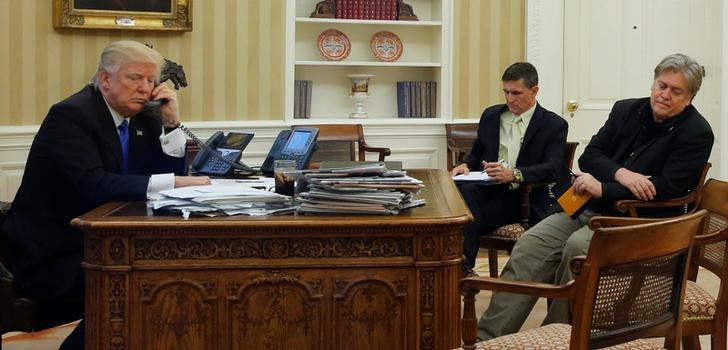By Jane Wardell and Roberta Rampton
SYDNEY/WASHINGTON (Reuters) - U.S. ties with staunch ally Australia became strained on Thursday after details about an acrimonious phone call between its leaders emerged and U.S. President Donald Trump said a deal between the two nations on refugee resettlement was "dumb."
During a 25-minute phone call last Saturday with Australian Prime Minister Malcolm Turnbull, Trump accused Australia of trying to export the "next Boston bombers" under the agreement, the Washington Post reported.
The Post, which cited unidentified senior U.S. officials, said that Trump abruptly ended the call and told Turnbull that it was the "worst call by far" he'd had with a foreign leader.
The description of the call and a subsequent tweet from Trump promising to study what he called a "dumb deal" caused concern among lawmakers from Republican and Democratic parties.
"We always have reason to be concerned with respect to anytime our relationship with an ally might go sour. My hope is that it won't," Republican Senator Mike Lee told CNN.
"My hope is that we can achieve whatever objectives the president's willing to pursue in a way that won't damage the trade relationship or won't damage other aspects of our relationship," Lee said.
Representative Steny Hoyer, the No. 2 Democrat in the House of Representatives, urged Trump to apologize, while Republican Senator John McCain, chairman of the Armed Services Committee, said he called Australia's U.S. ambassador to express his support.
During former President Barack Obama's administration, the United States agreed to resettle up to 1,250 asylum seekers held in offshore processing camps on Pacific islands in Papua New Guinea and Nauru. In return, Australia would resettle refugees from El Salvador, Guatemala and Honduras.
The rift between Washington and Canberra that has developed over the resettlement deal could have serious repercussions. Australia and the United States are among five nations that make up the Five Eyes group, the world's leading intelligence-sharing network.
Later on Thursday, Trump told reporters at the White House he would "respect" the refugee agreement with Australia.
But Trump made it clear he was not pleased, saying it was an example of countries taking advantage of the United States.
"Why are we doing this, what's the purpose? So, we'll see what happens," Trump said.
REFUGEES AT ISSUE
The call between Trump and Turnbull came at the end of a day of widespread protests and confusion over Trump's order for a 120-day halt of the U.S. refugee program and a 90-day suspension on visits from people from seven predominantly Muslim countries.
Many of the people being held in the Australian detention centers, which have drawn harsh criticism from the United Nations and human rights groups, fled violence in countries such as Afghanistan, Iraq and Iran.
White House spokesman Sean Spicer said Trump was "unbelievably disappointed" and "extremely, extremely upset" with the deal, but said it would go ahead.
Spicer said all refugees presented to the United States would be subject to "extreme vetting" to ensure they do not pose security risks.
Turnbull told reporters he was surprised and disappointed that details of the call with Trump had been leaked but gave few particulars other than to deny reports Trump had hung up on him.
"As far as the call is concerned, the report that the president hung up is not correct. The call ended courteously. And as far as the nature of the discussion, it was very frank and forthright," he told a Sydney radio station on Thursday.
UNPRECEDENTED ACRIMONY
Australian Ambassador to the United States Joe Hockey had a "productive meeting" with White House chief of staff Reince Priebus and top strategist Steve Bannon on Thursday, a White House official said, adding the men had conveyed Trump's "deep admiration for the Australian people" during the meeting.
Political analysts said the acrimony between the two countries was unprecedented, surpassing even the difficult relations between former U.S. President Richard Nixon and then-Australian Prime Minister Gough Whitlam, who withdrew the country's troops during the Vietnam War.
"Even that was always done in the language of foreign policy niceties," said Harry Phillips, a political analyst of 40 years experience at Edith Cowan and Curtin universities in Perth.
Australia, New Zealand and the United States have been allies under a formal security treaty since 1951. They co-operate on military matters in the Pacific region, although today the treaty is taken to relate to conflicts worldwide.
The United States plans to send extra military aircraft to Australia's tropical north this year as part of a U.S. Marines deployment that will bolster its military presence close to the disputed South China Sea.

Australia is also one of 10 U.S. allies purchasing Lockheed Martin's (N:LMT) F-35 fighter jet program.